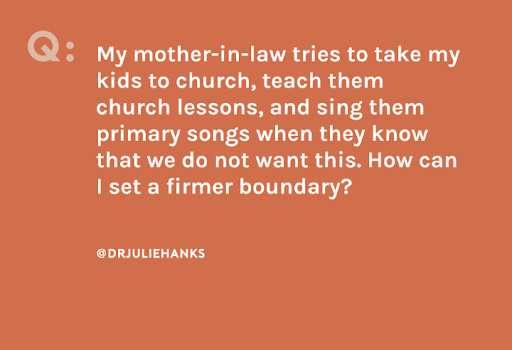I was raised watching boundaries in action. I recall one Christmas when a large box arrived filled with gifts from my grandma. Standing there next to my mom, I watched with excitement as she took each package out and read the name of the recipient. When she paused and pursed her lips toward the end, I knew none of them would be opened. All of the packages went back into the box to be returned with a note:
“Mom, thank you for thinking of us. You forgot someone very important to us.”
The “someone” being my dad. My Southern Baptist grandma didn’t like him. Not because he was unkind. Dad treated her daughter like a queen and provided tenderly for her grandchildren. But he was a “Mormon boy,” and grandma simply couldn’t abide that.
I don’t know how many times other boundaries were drawn. And I don’t know all the conversations that took place—or those that didn’t. She and my grandma were gone long before talk of “boundaries” began to dominate our cultural landscape.
Dr. Brene Brown began popularizing boundary talk over a decade ago. I can see that much of what she and others have subsequently taught would have blessed the matriarchs of my family—especially when paired with balancing reminders to keep prioritizing deeper connection. As Dr. Brown has written wisely:
“Living a connected life ultimately is about setting boundaries, spending less time and energy hustling and winning over people … and seeing the value of working on cultivating connection with family and close friends.”
It’s clear that boundaries can be a valuable tool for our emotional health and especially crucial in abusive situations. Yet could there be times that boundaries may be overapplied and misapplied in ways that can potentially estrange and isolate otherwise beneficial relationships? Could there be times that boundaries may be overapplied?[
- “You can make sure you let them know, ‘My choices are not up for discussion; please don’t mention it again.’”
- “Please do not have discussions with our children about church-related things or take them to church without our permission. I know you’re doing what you think is best and that you have loving intentions, and we are asking you clearly to stop doing this. Thanks, Mom, for respecting this boundary.” ⠀
This is stated quite respectfully. And yet the interactions these kinds of suggestions likely prompt are the moments that break a mother’s (or grandmother’s) heart. I have some very sweet memories of attending church with my grandma and her friends in our fancy polyester pantsuits—with her buying me sparkly birthstone “cross” necklaces and teaching me some pretty cute Bible-belt Baptist “primary” songs. My grandma loved Jesus, and that didn’t feel threatening to my mom and dad or the faith and covenants they lovingly lived in our home; I cherish them to this day. My grandma added to that love for my Savior, and I’m grateful my mom had the wisdom and confidence to not draw a boundary around that.

With a particular focus on “boundaries with the Church” for women with a Latter-day Saint background, Dr. Julie Hanks occupies an important place in the larger discussion. She has elsewhere recommended, “it is helpful to set really clear boundaries if communication between you and your orthodox parents is a pain point. What topics are you willing to discuss with them? What are you not comfortable hearing or talking about?” And in her public teaching and writing, Dr. Hanks encourages responding to questions that feel uncomfortable by saying, “That’s a personal decision, and I’m not interested in discussing it with you.”
There are times in all of our lives when we need to draw some lines. But unbalanced against other aspirations and principles, such boundary advice may effectively harden and estrange relationships with loved ones—suggesting language that shuts down meaningful conversation and encourages family members to essentially cut themselves off from relationships as a whole. It seems important to balance boundary-setting with sympathy.
‘Your pain is not my problem.’ This same therapist has also said, “If you choose to communicate your change in faith, it’s okay to let your family be uncomfortable or shocked or feel whatever they feel. You are not the cause of it. You can let them feel what they need to feel.”
An invitation to make space for present feelings can be helpful; however, it excludes the impact we have on others, especially because some expect active members to openly validate the experience of someone walking away. One woman described the difficulty she experienced when a loved one left the Church and let her know she wasn’t allowed to express feelings of dismay:
“The implication that I shouldn’t be sad was hurtful even. To not be sad means I don’t think a choice to leave the Church and step away from promises made matters. It suggests I don’t believe the ramifications are significant and impact generations. It implies I don’t really believe everything I try to live in regard to my testimony. As pleasant as it might make things for them if I weren’t sad, it’s kind of [unfair] to expect me not to be.”
Once again, not taking responsibility for others’ emotions is a healthy psychological principle—especially when emotions are intense. But so also is feeling some of what others are feeling. And that’s where an attitude of “your pain is not my problem” can distract from natural empathy that could otherwise be felt for family members.
Hearts of the children turned against their fathers + mothers? The depth of love and concern parents have for their children is well-known and central to so much of life. Yet we all know what it’s like to feel undue pressure or lack of space in relation to a parent or other authority figure. When this happens, some guidance around appropriate boundaries can again be helpful. And Dr. Hanks has said: “Part of being an adult is claiming your life as yours instead of trying to fill the mold your parents imagined for you. It’s okay for you to have different expectations and thoughts than they have. They did their job of raising you, and now you get to decide what you want for your life.” Elsewhere, Dr. Hanks suggested that “Part of maturity is disappointing your parents. It’s about letting go of trying to control how they see you.”

However helpful a reminder about healthy parent-child boundaries can be, an overdone emphasis in this direction can start to feel like a contrast with inspired counsel such as, “honor thy father and thy mother that thy days may be long upon the land.”
My parents weren’t perfect; my husband and I are not, nor will our children be. That’s not an indictment; simply, none are. Yet maybe that’s one reason that the Father of us all provides us with such reminders to not give up on the honor they are due.
What we’re bringing attention to here is the extent to which inadvertent distance might arise from overly aggressive boundary-setting—the kind that can prompt family interactions that are fairly callous and lacking in empathy. In this case, it seems important to balance boundary-setting with sympathy for others’ perspectives.
For instance, none of us likes to hear repeated advice we’re not in a good place to hear—another sensible time for a boundary. Can that be done without insinuating ill motives on the part of people encouraging us in another direction?
Too often, people are jumping to conclusions that such encouragement is an attempt to “manipulate,” or pressure or “control” others. Dr. Hanks goes on to encourage people in these situations to “ask your family member to not share their spiritual impressions with you”:
“Whether it be ‘dreams’ or ‘spiritual feelings,’ you’re giving their spiritual feelings too much power over you. Your life isn’t their stewardship anymore; it’s yours. Don’t give your family’s spiritual feelings more power over your own. Set those boundaries!”
We wonder again if this kind of advice—without any further qualification—can inadvertently end up creating not simply space in a relationship, but a chasm, as respect for parental stewardship and sincere inspiration by other family members is hollowed out and replaced with automatic resistance and even contempt. If so, this may help explain why some of these teachings have prompted pain and contention online and offline between former brothers and sisters in the gospel and within families.
Is some of this boundary advice, then, having unintended effects—essentially giving people an excuse (and professional permission) to close themselves off to their family’s understandable and legitimate feelings?
Holding onto the possibility of reconciliation. In the most recent season of The Chosen, we see Matthew’s father setting a clear boundary, telling him, “don’t call me Abba … I have no son.” But then Matthew hears the Sermon on the Mount, where Jesus—among other things—encourages followers to proactively seek reconciliation where possible.
Matthew decides to try just that—returning home with humility and anxiety, wondering if his father will reject him once more. Instead, however, a miracle happens: father and son return to a warm relationship again.
Do we give up too quickly on this same miracle happening in some of our own relationships? One friend shared a story of his mother grappling with an invitation from her birth mother to refer to her as “mom.” Though at first it felt awkward, and even in opposition to the advice of a family therapist, she chose to honor the heartfelt request. She did so, not out of a begrudging sense of duty or dismissive of her own feelings, but because, as she said, “Were my feelings more important than the potential of this relationship?” Today she is grateful for the warm mother/daughter relationship they share, built on mutual sacrifice and respect.
Like many other families, we’ve experienced profound blessings from forgiveness—in what Elder Jeffrey Holland has called the “ministry of reconciliation.” If that was the priority of Jesus in his ministry, should it not be ours as well?
Once again, there’s no question boundaries can be needful, and we have a responsibility and accountability to these aspects of emotional and relational health. The ancient prophet Nephi felt prompted to draw a clear boundary after his father’s death when it became clear Laman and Lemuel would continue to be a threat to his life and family. And Christ Himself requested mocking and disruptive people to leave and went alone to the mountains to pray.
As we approach this season and the start of a new year, we simply encourage a balanced emphasis on boundaries that build rather than estrange. When somebody matters, seek reconciliation and forge paths toward forgiveness.
In those efforts, God can meet our deepest needs. A modern-day apostle has taught us how to refortify at such times. “Whenever we struggle or feel exhausted, we can always turn to Heavenly Father and the Savior. They can rescue us and support us because Their capacity is infinite. There are no boundaries to Their healing power.”
Their gifts are eternal and the best protective influence for us all.
The post It’s Time to Rethink Boundaries appeared first on Public Square Magazine.
Continue reading at the original source →



